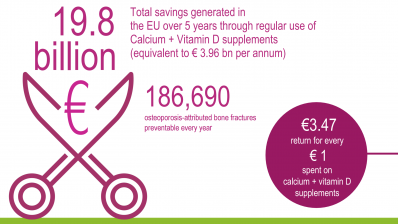Omega-3 could decrease mortality rate in postmenopausal women, study suggests

The research, published in the Journal of Clinical Lipidology, looked at associations between omega-3 index scores - a measure of EPA and DHA levels in red blood cells - and all-cause mortality rates in a population of postmenopausal women over a 15 year period.
Women with the highest omega-3 status were found to be 20% less likely to die from any cause than those with the lowest omega-3 levels, said the team.
"This is the largest -but far from the only - study to confirm that blood levels of EPA and DHA omega-3 fatty acids, in this case the omega-3 index, are independent predictors of risk for death," said Dr. William Harris, lead author of the study and founder of OmegaQuant Analytics, where the samples were analysed. "These findings support the view that higher EPA and DHA omega-3 levels are associated with better overall health."
The research, which was funded by a grant from the National Heart, Lung and Blood Institute in the United States, followed more than 6,500 women to assess the relationship between omega-3 index and health outcomes. Overall, researchers found that higher levels of red blood cell PUFAs correlated significantly with a lower risk of non-cardiovascular disease (CVD) and non-cancer deaths.
"This study adds to a larger body of evidence demonstrating the positive correlation between higher omega-3 index levels and general wellness," said Adam Ismail, executive director of the Global Organization for EPA and DHA Omega-3s (GOED). "The results gathered over a 15-year period support the notion that adequate omega-3 intake is an important part of a healthy lifestyle, just like exercise and following a well-balanced diet."
A portion of salmon a day can keep the doctors away
Harris and colleagues reported that people in the highest group of omega-3 status, with an average omega-3 index score of 7.11%, had significantly lower risk of all cause mortality than those with the lowest status, with an average omega-3 index score of just 3.59%. Furthermore, participants who died (n= 1851) during follow up were found to have had a lower omega-3 index at baseline, than those who lived.
The team also reported that higher levels of EPA were found to have a significant inverse relationship with risk of cardiovascular disease (CVD) death, but the same was not found for DHA.
A higher overall omega-3 index was also associated with older age, greater alcohol intake, higher education, increased physical activity, more frequent use of cholesterol-lowering medications, less smoking and lower BMI.
Researchers concluded in their study that two and a half fillets of salmon each week provided an adequate amount of omega-3 PUFAs to be considered a safe high amount. They said that estimated intakes suggest that approximately 1g of EPA and DHA per day would be required to increase omega-3 status for those in the lowest omega-3 status group to a levelwhere they were in the highest group. This amount also translates to between one and three softgel omega-3 supplements or one teaspoon of a liquid omega-3 supplement daily.
Salmon, tuna and sardines are fish which are high in omega-3 PUFAs.
Source: Journal of Clinical Lipidology
Published online ahead of print, doi: 10.1016/j.jacl.2016.12.013
"Red blood cell polyunsaturated fatty acids and mortality in the Women's Health Initiative Memory Study"
Authors: William S. Harris, et al















